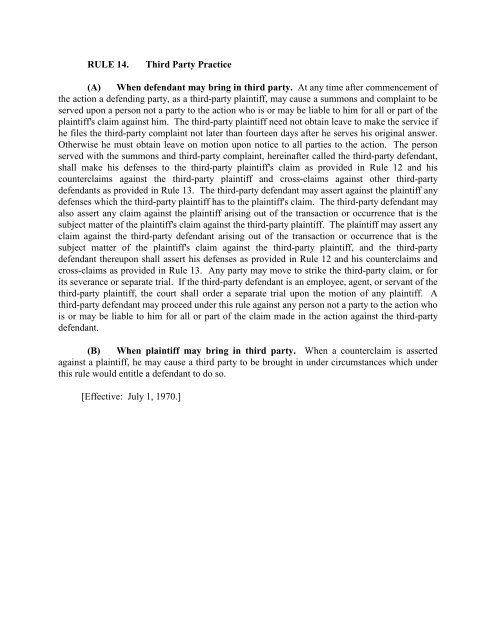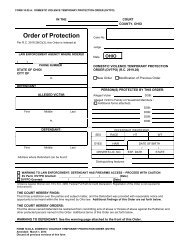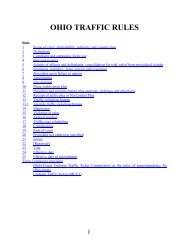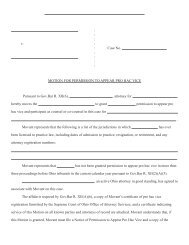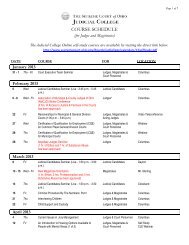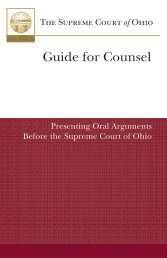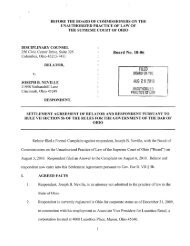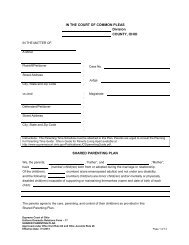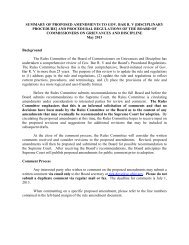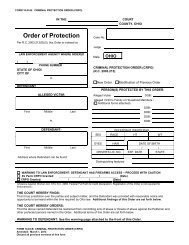- Page 1 and 2: OHIO RULES OF CIVIL PROCEDURETitle
- Page 3 and 4: Title VII JUDGMENTRule54 Judgments;
- Page 5 and 6: TITLE I. SCOPE OF RULES--ONE FORM O
- Page 10 and 11: (2) After final judgment, or upon d
- Page 12 and 13: Nonsubstantive grammatical revision
- Page 14 and 15: Staff Note (July 1, 2008 Amendment)
- Page 16 and 17: (B) Personal service. When the plai
- Page 18 and 19: RULE 4.2Process: Who May be ServedS
- Page 20 and 21: Division (G) is inserted into Civ.R
- Page 22 and 23: (10) Causing tortious injury to any
- Page 24 and 25: RULE 4.4Process: Service by Publica
- Page 26 and 27: RULE 4.5Process: Alternative Provis
- Page 28 and 29: RULE 4.6Process: Limits; Amendment;
- Page 30 and 31: RULE 5.Original ComplaintService an
- Page 32 and 33: Staff Note (July 1, 2012 Amendment)
- Page 34 and 35: Staff Note (July 1, 2012 Amendment)
- Page 36 and 37: RULE 8.General Rules of Pleading(A)
- Page 38 and 39: RULE 9.Pleading Special Matters(A)
- Page 40 and 41: (b) The plaintiff may file a motion
- Page 42 and 43: Staff Note (July 1, 2005 Amendment)
- Page 44 and 45: equires that courts submit any loca
- Page 46 and 47: (D) Preliminary hearings. The defen
- Page 50 and 51: RULE 15.Amended and Supplemental Pl
- Page 52 and 53: RULE 16.Pretrial ProcedureIn any ac
- Page 54 and 55: TITLE IV. PARTIESRULE 17.Parties Pl
- Page 56 and 57: RULE 19. Joinder of Persons Needed
- Page 58 and 59: Staff Note (July 1, 1996 Amendment)
- Page 60 and 61: RULE 21.Misjoinder and Nonjoinder o
- Page 62 and 63: RULE 23.Class Actions(A) Prerequisi
- Page 64 and 65: RULE 23.1. Derivative Actions by Sh
- Page 66 and 67: RULE 25.Substitution of Parties(A)D
- Page 68 and 69: (4) Electronically stored informati
- Page 70 and 71: e conducted with on one present exc
- Page 72 and 73: RULE 27.AppealPerpetuation of Testi
- Page 74 and 75: (G) Construction of rule. This rule
- Page 76 and 77: Staff Note (July 1, 2001 Amendment)
- Page 78 and 79: RULE 30.Depositions upon oral exami
- Page 80 and 81: The deposition shall then be signed
- Page 82 and 83: Staff Note (July 1, 1997 Amendment)
- Page 84: RULE 32.Use of Depositions in Court
- Page 87 and 88: RULE 33.Interrogatories to Parties(
- Page 89 and 90: Similar amendments have been made t
- Page 91 and 92: RULE 34. Producing documents, elect
- Page 93 and 94: (b)The petitioner is otherwise unab
- Page 95 and 96: RULE 35.Physical and Mental Examina
- Page 97 and 98: (B) Effect of admission. Any matter
- Page 99 and 100:
The Rules Advisory Committee is awa
- Page 101 and 102:
(2) If any party or an officer, dir
- Page 103 and 104:
Staff Note (July 1, 2008 Amendment)
- Page 105 and 106:
RULE 39.Trial by Jury or by the Cou
- Page 107 and 108:
RULE 41.Dismissal of Actions(A)Volu
- Page 109 and 110:
RULE 42.Consolidation; Separate Tri
- Page 111 and 112:
RULE 43.[RESERVED]
- Page 113 and 114:
RULE 44.1. Judicial Notice of Certa
- Page 115 and 116:
(2) The clerk shall issue a subpoen
- Page 117 and 118:
form that is reasonably useable. Un
- Page 119 and 120:
Staff Note (July 1, 2012 Amendment)
- Page 121 and 122:
RULE 46.Exceptions UnnecessaryAn ex
- Page 123 and 124:
against an alternate juror only, an
- Page 125 and 126:
challenge waives that challenge but
- Page 127 and 128:
RULE 48.Juries: Majority Verdict; S
- Page 129 and 130:
RULE 50.VerdictMotion for a Directe
- Page 131 and 132:
RULE 51.Instructions to the Jury; O
- Page 133 and 134:
RULE 52.Findings by the CourtWhen q
- Page 135 and 136:
(f) Imposing, subject to Civ. R. 53
- Page 137 and 138:
(4) Action of court on magistrate
- Page 139 and 140:
for the judicial functions but only
- Page 141 and 142:
Action of court on magistrate’s d
- Page 143 and 144:
In re Disqualification of Light (19
- Page 145 and 146:
[now division (E)(3)(d)]. First, th
- Page 147 and 148:
Rule 53(D) ProceedingsPrior languag
- Page 149 and 150:
RULE 55.Default(A) Entry of judgmen
- Page 151 and 152:
to in an affidavit shall be attache
- Page 153 and 154:
RULE 57.Declaratory JudgmentsThe pr
- Page 155 and 156:
RULE 59.New Trials(A) Grounds. A ne
- Page 157 and 158:
RULE 60.Relief From Judgment or Ord
- Page 159 and 160:
RULE 62.Stay of Proceedings to Enfo
- Page 161 and 162:
TITLE VIII. PROVISIONAL AND FINAL R
- Page 163 and 164:
(C) Security. No temporary restrain
- Page 165 and 166:
RULE 65.1. Civil Protection Orders(
- Page 167 and 168:
(i) A magistrate’s denial or gran
- Page 169 and 170:
Division (E): Appointed counsel for
- Page 171 and 172:
RULE 67.[RESERVED]
- Page 173 and 174:
RULE 69.ExecutionProcess to enforce
- Page 175 and 176:
RULE 71.Process in Behalf of and Ag
- Page 177 and 178:
TITLE IX. PROBATE, JUVENILE, ANDDOM
- Page 179 and 180:
No pleading, application, acknowled
- Page 181 and 182:
RULE 74.[RESERVED][Former Rule 74,
- Page 183 and 184:
(F) Judgment. The provisions of Civ
- Page 185:
for the care of children is journal
- Page 188 and 189:
Rule 75(G) Relief pending appeal.St
- Page 190 and 191:
RULE 77 TO 80.[RESERVED]
- Page 192 and 193:
TITLE X. GENERAL PROVISIONSRULE 82.
- Page 194 and 195:
RULE 84.FormsThe forms contained in
- Page 196 and 197:
RULE 86.Effective Date(A) Effective
- Page 198 and 199:
(M) Effective date of amendments. T
- Page 200 and 201:
(Y) Effective date of amendments. T
- Page 202 and 203:
(LL) Effective date of amendments.
- Page 204 and 205:
FORM 1. CAPTION AND SUMMONSCOURT OF
- Page 206 and 207:
INSTRUCTIONS FOR PERSONAL OR RESIDE
- Page 208 and 209:
RETURN OF SERVICE OF SUMMONS(RESIDE
- Page 210 and 211:
FORM 2. COMPLAINT ON A PROMISSORY N
- Page 212 and 213:
FORM 3. COMPLAINT ON AN ACCOUNTDefe
- Page 214 and 215:
FORM 5. COMPLAINT FOR MONEY LENTDef
- Page 216 and 217:
FORM 7. COMPLAINT FOR MONEY HAD AND
- Page 218 and 219:
FORM 9. COMPLAINT FOR NEGLIGENCE WH
- Page 220 and 221:
FORM 11. COMPLAINT FOR SPECIFIC PER
- Page 222 and 223:
FORM 13. COMPLAINT FOR INTERPLEADER
- Page 224 and 225:
SERVICE OF COPYA copy hereof was se
- Page 226 and 227:
CROSS-CLAIM AGAINST DEFENDANT M.N.[
- Page 228 and 229:
FORM 16A. COMPLAINT AGAINST THIRD-P
- Page 230 and 231:
FORM 18. JUDGMENT ON JURY VERDICTCO
- Page 232 and 233:
NoteThis form is illustrative of th
- Page 234 and 235:
B. COMPUTATION OF CURRENT INCOMEHus
- Page 236 and 237:
B. OTHER MONTHLY LIVING EXPENSESFoo
- Page 238 and 239:
Charitable contributions $Membershi
- Page 240 and 241:
COURT OF COMMON PLEASCOUNTY, OHIOPl
- Page 242 and 243:
CategoryDescription(List who has po
- Page 244 and 245:
1.2.3.4.1.2.I. Transfer of Assets E
- Page 246 and 247:
V. BANKRUPTCYFiled by: Wife,Husband
- Page 248 and 249:
. Child’s Name: Place of Birth:Da
- Page 250 and 251:
6. Persons not a party to this case
- Page 252 and 253:
MotherFatherUnder the available ins
- Page 254 and 255:
Complete the following information,
- Page 256 and 257:
OATH(Do not sign until notary is pr
- Page 258 and 259:
IN THE COURT OF COMMON PLEASDivisio
- Page 260 and 261:
IN THE COURT OF COMMON PLEASDivisio
- Page 262 and 263:
child(ren):The non-residential pare
- Page 264 and 265:
4. I state regarding children (chec
- Page 266 and 267:
IN THE COURT OF COMMON PLEASDivisio
- Page 268 and 269:
CERTIFICATE OF SERVICEI delivered a
- Page 270 and 271:
The dates of birth of children who
- Page 272 and 273:
IN THE COURT OF COMMON PLEASDivisio
- Page 274 and 275:
J. The parties that appeared have h
- Page 276 and 277:
E. Other orders regarding property
- Page 278 and 279:
2E. Deductibility of Spousal Suppor
- Page 280 and 281:
B. Present at the hearing were the:
- Page 282 and 283:
The Defendant or Plaintiff is guilt
- Page 284 and 285:
B. The Defendant shall pay the foll
- Page 286 and 287:
Mother shall be the residential par
- Page 288 and 289:
SEVENTH: HEALTH INSURANCE COVERAGEA
- Page 290 and 291:
The total of child support and cash
- Page 292 and 293:
The Obligor and/or Obligee required
- Page 294 and 295:
2claim the minor child(ren).TENTH:
- Page 296 and 297:
IN THE COURT OF COMMON PLEASDivisio
- Page 298 and 299:
1The Petitioners request the Court
- Page 300 and 301:
4. Check all that apply:The Wife is
- Page 302 and 303:
IN THE COURT OF COMMON PLEASDivisio
- Page 304 and 305:
2. Marital Real EstateThe parties o
- Page 306 and 307:
The parties shall make arrangements
- Page 308 and 309:
3. One or both parties has/have bus
- Page 310 and 311:
and Wife shall receive the followin
- Page 312 and 313:
theat his/her place of employment.C
- Page 314 and 315:
Each party waives all rights of inh
- Page 316 and 317:
FIRST: PARENTS’ RIGHTSThe parents
- Page 318 and 319:
F. Other orders:G. Public BenefitsF
- Page 320 and 321:
N. School Activities Access NoticeP
- Page 322 and 323:
FOURTH: CHILD SUPPORTAs required by
- Page 324 and 325:
The relative financial resources, o
- Page 326 and 327:
for the child(ren) is also required
- Page 328 and 329:
in question:B. Other orders regardi
- Page 330 and 331:
FIRST: PARENTS’ RIGHTSWe, the par
- Page 332 and 333:
with notice to both parents to dete
- Page 334 and 335:
policy, contract, or plan to either
- Page 336 and 337:
Extended parenting time or extraord
- Page 338 and 339:
• Child’s death• Child’s ma
- Page 340 and 341:
H. ArrearageAny temporary child sup
- Page 342 and 343:
IN THE COURT OF COMMON PLEASDivisio
- Page 344 and 345:
IN THE MATTER OF:IN THE COURT OF CO
- Page 346 and 347:
IN THE COURT OF COMMON PLEASDivisio
- Page 348 and 349:
1INSTRUCTIONS TO THE CLERKYou are d
- Page 350 and 351:
2. Select one:parent and/or legal c
- Page 352 and 353:
2. Select one:(name) is currently d
- Page 354 and 355:
2. The person responsible for provi
- Page 356 and 357:
IN THE COURT OF COMMON PLEASDivisio
- Page 358 and 359:
IN THE COURT OF COMMON PLEASDivisio


